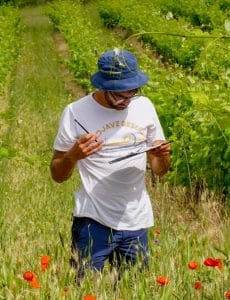
- This event has passed.
7 April 2025 @ 1.30pm - 15h30

Mr Emile Melloul, PhD student at UMR IMBE, Ecology, Ecotoxicology & Chemistry applied to Agroecology and Restoration team, will publicly defend his thesis on Monday 7 April 2025, at 1.30pm in the IUT Avignon lecture theatre.
In front of a jury made up of :
Mickaël HeddeDirector of Research, INRAE, Eco&Sols, Montpellier, Rapporteur
Mr Sébastien BarotDirector of Research, IRD, IEES Paris, Rapporteur
Ms Appoline AuclercProfessor, University of Lorraine, ENSAIA, Vandœuvre-lès-Nancy, Examiner
Mrs Estelle ForeyProfessor, University of Rouen Normandie, ECODIV, Mont Saint-Aignan, Examiner
Mr Armin BischoffProfessor, Avignon University, IMBE, Avignon, Thesis supervisor
Olivier BlightLecturer, Avignon University, IMBE, Avignon, Thesis co-supervisor
Mr Raphaël GrosProfessor, Aix-Marseille University, IMBE, Marseille, thesis co-supervisor
Summary of work:
Irrigation is a common practice in agriculture, helping in particular to improve crop yields. It is also one of the main ways in which farmers are responding to climate change, which is expected to lead to changes in rainfall patterns and higher temperatures. These changes will be particularly pronounced in the Mediterranean region, where higher temperatures and more frequent and intense droughts are expected.
Irrigation is booming in the vineyards. It is used to stabilise production and regulate sugar levels in the wine. It is mainly used as a drip irrigation system during periods of drought, to simulate the effects of summer thunderstorms. Although beneficial for production in a context of water stress, increased humidity could affect the biodiversity of the agroecosystem by modifying its composition, structure and interaction networks. This could affect key ecological functions, with repercussions for crops. It is therefore vital to gain a better understanding of the effects and processes associated with irrigation, which is becoming increasingly frequent and intense.
This is the background to my thesis, which aims to gain a better understanding of the effects of irrigation on biodiversity in Mediterranean wine-growing agroecosystems. This led to three main research questions: (1) What effects does irrigation have on vegetation and epigeous arthropods in vine inter-rows? (2) What effects does irrigation have on vegetation and soil organisms in the short and medium term under the vine row? (3) How do the effects of irrigation evolve in the short term during the summer period?
In the first axis (1), we showed a reduction in floral cover in the irrigated vineyards, without however observing any difference in terms of species richness. The abundance of several beneficial arthropods was directly affected by irrigation. These direct effects were amplified by the negative impact of irrigation on floral cover. Predation rates were also lower in irrigated vineyards, but only during the day. In the second axis (2), no clear effect of irrigation was observed on vegetation under the vine row. However, an increase in soil fauna was noted during the summer period, at the time of irrigation, with an increase in predatory mite populations and a change in the structure of mite and springtail communities. Irrigation appears to mitigate the effects of drought, which have a negative impact on springtails and mites. Springtails, which are more sensitive to drought, were absent from the surveys carried out in August. In the third axis (3), the addition of water to the vines during the drought period had a priming effect on the bacteria, but did not alter the composition of the microbial community. In addition, we observed an increase in the abundance of springtails and mites, as well as an increase in biological activity in the soil. The more drought-resistant organisms were not affected by the irrigation. The effects of irrigation disappeared after just a few days. However, in the long term, there could be a potential depletion of soil organic matter due to peaks in activity during rewetting cycles.
All these results highlight the importance of studying the effects of irrigation and their temporality, in a context where its use is tending to become the norm. This thesis opens up new perspectives on the potential effects of irrigation, particularly in terms of the functional traits of organisms and the specific composition of communities.
